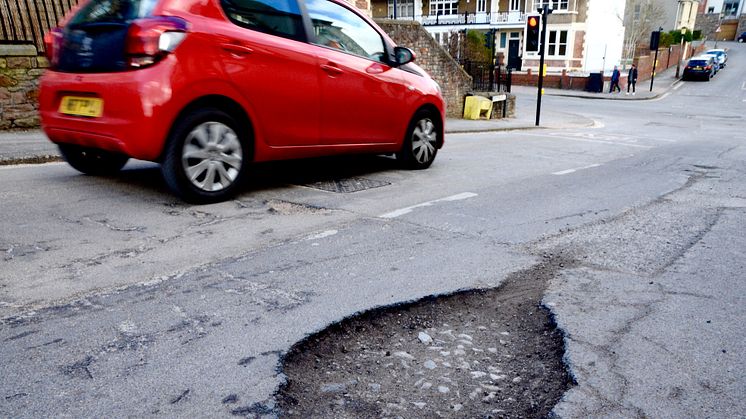Press release -
RAC data shows road quality has worsened despite mild weather
The quality of the UK’s roads may be worsening according to data from the RAC’s Pothole Index which shows there has been a 31% increase in pothole-related faults attended by its patrols in the second quarter of 2017 compared to the same period last year.
Between April and June RAC patrols went to the rescue of 3,565 motorists whose vehicles had suffered broken suspension springs, damaged shock absorbers or distorted wheels – issues that could be largely attributable to poor road surfaces – in stark contrast to 2,725 similar breakdowns in the same three months of 2016.
Fortunately though, the customary decline in the number of these faults from the first three months of the year to the second was greater in 2017 than usual at 46% (6,559 in Q1 to 3,565 in Q2) – there was only a 32% decrease in 2016 (4,026 Q1 to 2,725 in Q2).
What’s more, the most accurate reflection of the state of the country’s roads – the RAC Pothole Index, which is a 12-month rolling average of pothole-related breakdowns corrected to remove unrelated longer term effects of weather and improving vehicle reliability, also indicates a worsening picture after five successive quarters of improvement.
As of the second quarter of 2017 the index stands at 2.2, having begun at a base of 1.0 in 2006. This is an increase on the first quarter of the year when it stood at 2.08 – the lowest figure recorded since Q4 2008 – and the first increase seen since the beginning of 2016. Nevertheless, it should be pointed out that overall road conditions are still vastly better than the high index point of 3.5 in January to March 2010.
When considered in the context of all RAC breakdowns the share of pothole-related call-outs in the second quarter of 2017 equates to 1.6% of all RAC jobs which is the fourth highest Q2 figure seen over the 11 years since 2006, which is the start date for the RAC’s analysis.
RAC chief engineer David Bizley said: “After a period of steady improvement, it is disappointing to see an unwelcome rise in the number of pothole-related breakdowns RAC patrols dealt with in the second three months of the year when compared to the same period in 2016. However, the volume of pothole tracker breakdowns attended in the first quarter of this year was particularly high and it is good news that there was a big drop in the number of such breakdowns between quarter one and quarter two, though we expect to see such a fall as we go from winter to spring.
“The most worrying aspect, however, is the fact that this year’s weather has been so much milder and drier than in the equivalent six months last year and, for this reason, we should have expected the numbers for the second quarter to be lower.
“A short-term reversal in the fragile improvement in surface quality of the UK’s roads may not seem much to be concerned about but we fear it would only take a spell of very cold or wet weather for the improvements of the last year or two to evaporate and for the nation to find itself in a situation when we would once again be seeking emergency funding from Government to address the worst affected roads.
“While there is now long-term investment in place to maintain and improve our major roads, local roads still play a vital part in enabling the economy and remain motorists’ number-one transport investment priority for central Government. They must not be neglected and this is why we are still calling on the Government to recognise their national significance and to mirror their approach to major roads and ring-fence a dedicated fund for this purpose.”
Topics
Categories
Notes to Editors
About the RAC
First formed in 1897 the RAC has been looking after the needs of its members and championing the interests of motorists for 120 years.
Today it has more than eight million members and is one of the UK’s most progressive motoring organisations, providing services for both private and business motorists. Whether it's roadside assistance, insurance, buying a used car, vehicle inspections and checks, legal services or up-to-the-minute traffic and travel information – the RAC offers a solution for all motoring needs. The RAC is committed to making motoring easier, safer, more affordable and more enjoyable for drivers and road users.
The RAC is the motorist’s champion and campaigns to support the interests of its members and UK motorists at a national level. This includes voicing concerns about the increasing cost of motoring, particularly the price of fuel and the high level of tax levied on it, advancing levels of road safety, and supporting the needs of all drivers, from young to old.
The RAC’s annual Report on Motoring – first published in 1989 – provides a clear insight into the concerns and issues facing today’s motorists.
For the very latest news on UK fuel prices, check RAC Fuel Watch or follow #racfuelwatch on Twitter. RAC Fuel Watch is a comprehensive guide to the latest UK unleaded petrol and diesel prices – both at the wholesale level and at the pump. RAC Fuel Watch analyses how prices changed through the previous month and compares the most recent prices with those from three, six and 12 months before.
Key facts:
- RAC patrols fix four out of five vehicles at the roadside and on average within 30 minutes
- RAC vans carry more than 500 parts and tools to get members’ vehicles going again
- 92% of members would recommend RAC Rescue to their friends and family



